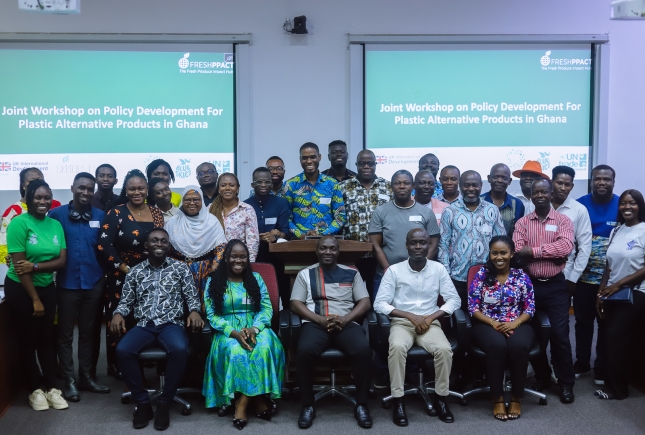
Stakeholders gather to drive sustainable plastic waste management in Ghana
The Fresh Produce Impact Hub (FRESHPACT) project, in collaboration with Blue Skies, the Ministry of Environment, Science, Technology, and Innovation (MESTI), and other stakeholders from Ghana’s plastic production and waste management sectors, convened a workshop on October 24, 2024, in Accra to address pressing issues in plastic waste management and policy development.
Hosted at the China Europe International Business School (CEIBS) in East Legon, the workshop sought to refine Ghana’s policies on plastic waste management, with a specific focus on alternatives to plastic products.
Dr. Ebenezer Laryea, Associate Professor of Sustainable Development at the University of Northampton and Director of FRESHPACT, underscored the importance of a global shift towards a green economy, where reduced plastic use is essential to environmental sustainability.
“Plastic use in agriculture, for example, is meant to aid crop growth by retaining moisture, but it often has unintended negative impacts on farmland and the broader environment,” Dr. Laryea stated.
He also shared a sobering statistic: “Ghana collects about 840,000 tonnes of plastic waste annually, but only 9.5% is recycled, showing the urgent need for more effective management strategies.”
The workshop brought together a diverse group, including government officials, industry leaders, academics, civil society representatives, and environmental activists. Participants were divided into groups for breakout sessions, where they engaged in targeted discussions on plastic alternatives and shared ideas on economic strategies, regulation, international standards, and the need for education and capacity building.
The Head of Internal Audit for Environment, Health, and Safety at Blue Skies, Mary Aka, highlighted the company’s efforts in recycling. “We encourage our fruit juice customers to return used bottles, which we then send to recycling partners.
It’s part of our commitment to reducing plastic waste,” she explained.
The Coordinator of the Zoomlion Foundation, Thomas Narh Korley, stressed the need for plastic waste education among young people. “Teaching schoolchildren about plastic’s environmental impact is vital to fostering responsibility and encouraging sustainable habits,” he noted, recommending that similar workshops be organized for students and youth groups.